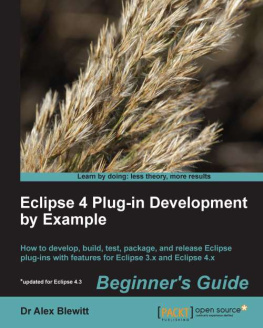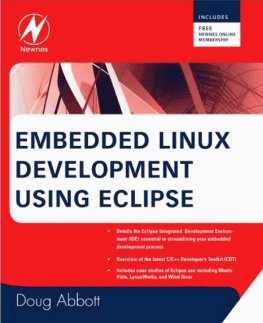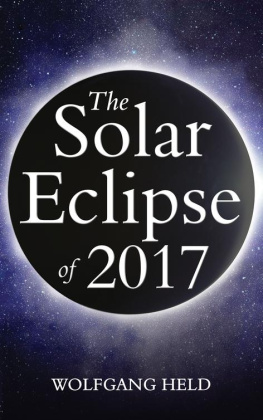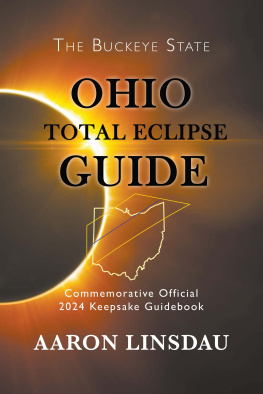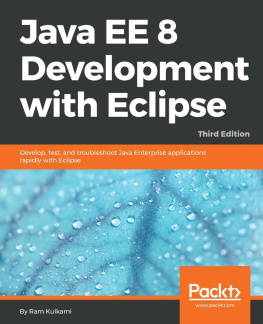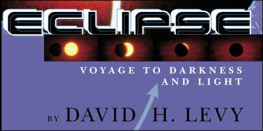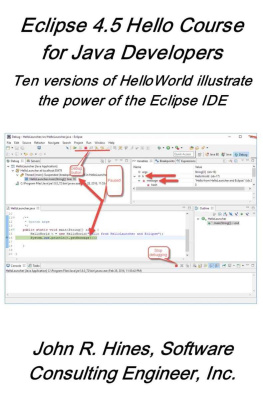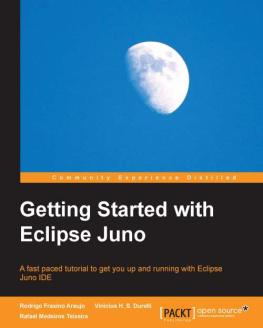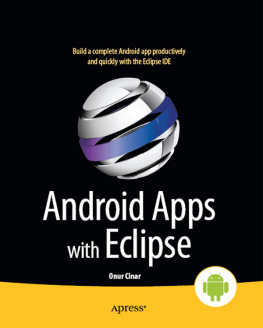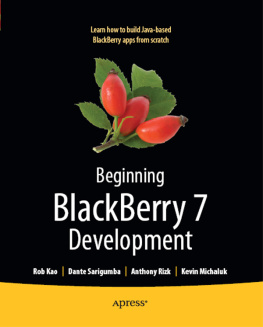Dr Alex Blewitt - Eclipse 4 Plug-in Development by Example: Beginners Guide
Here you can read online Dr Alex Blewitt - Eclipse 4 Plug-in Development by Example: Beginners Guide full text of the book (entire story) in english for free. Download pdf and epub, get meaning, cover and reviews about this ebook. year: 2013, publisher: Packt Publishing, genre: Computer. Description of the work, (preface) as well as reviews are available. Best literature library LitArk.com created for fans of good reading and offers a wide selection of genres:
Romance novel
Science fiction
Adventure
Detective
Science
History
Home and family
Prose
Art
Politics
Computer
Non-fiction
Religion
Business
Children
Humor
Choose a favorite category and find really read worthwhile books. Enjoy immersion in the world of imagination, feel the emotions of the characters or learn something new for yourself, make an fascinating discovery.
- Book:Eclipse 4 Plug-in Development by Example: Beginners Guide
- Author:
- Publisher:Packt Publishing
- Genre:
- Year:2013
- Rating:5 / 5
- Favourites:Add to favourites
- Your mark:
Eclipse 4 Plug-in Development by Example: Beginners Guide: summary, description and annotation
We offer to read an annotation, description, summary or preface (depends on what the author of the book "Eclipse 4 Plug-in Development by Example: Beginners Guide" wrote himself). If you haven't found the necessary information about the book — write in the comments, we will try to find it.
How to develop, build, test, package, and release Eclipse plug-ins with features for Eclipse 3.x and Eclipse 4.x
Overview
- Create plug-ins to extend the Eclipse runtime covering Eclipse 3.x and the changes required for Eclipse 4.x
- Plug-ins from design to distribution wide coverage of the entire process
- No prior OSGi or Eclipse plug-in development experience necessary
In Detail
As a highly extensible platform, Eclipse is used by everyone from independent software developers to NASA. Key to this is Eclipses plug-in ecosystem, which allows applications to be developed in a modular architecture and extended through its use of plug-ins and features.
Eclipse Plugin Development by Example: Beginners Guide takes the reader through the full journey of plug-in development, starting with an introduction to Eclipse plug-ins, continued through packaging and culminating in automated testing and deployment. The example code provides simple snippets which can be developed and extended to get you going quickly.
This book covers basics of plug-in development, creating user interfaces with both SWT and JFace, and interacting with the user and execution of long-running tasks in the background.
Example-based tasks such as creating and working with preferences and advanced tasks such as well as working with Eclipses files and resources. A specific chapter on the differences between Eclipse 3.x and Eclipse 4.x presents a detailed view of the changes needed by applications and plug-ins upgrading to the new model. Finally, the book concludes on how to package plug-ins into update sites, and build and test them automatically.
What you will learn from this book
- How to create plug-ins for Eclipse 3.x and 4.x and automatically test plug-ins with JUnit
- How to display tree and table information in views
- What are the specific differences between the Eclipse 3.x model and the Eclipse 4.x model
- How and when to build user interfaces from SWT and JFace
- How to run tasks in the background and update the user interface asynchronously
- How to build plug-ins, features and update sites with Maven Tycho and automate user interface tests with SWTBot
- How to store and obtain preferences, and how to integrate with the Preferences panel
- How to work with the Eclipse resources model for creating and updating files and reporting errors to the user
Approach
A Beginners Guide following the by Example approach. There will be 5-8 major examples that will be used in the book to develop advanced plugins with the Eclipse IDE.
Who this book is written for
This book is for Java developers who are familiar with Eclipse as a Java IDE and are interested in learning how to develop plug-ins for Eclipse. No prior knowledge of Eclipse plug-in development or OSGi is necessary, although you are expected to know how to create, run, and debug Java programs in Eclipse.
Dr Alex Blewitt: author's other books
Who wrote Eclipse 4 Plug-in Development by Example: Beginners Guide? Find out the surname, the name of the author of the book and a list of all author's works by series.

